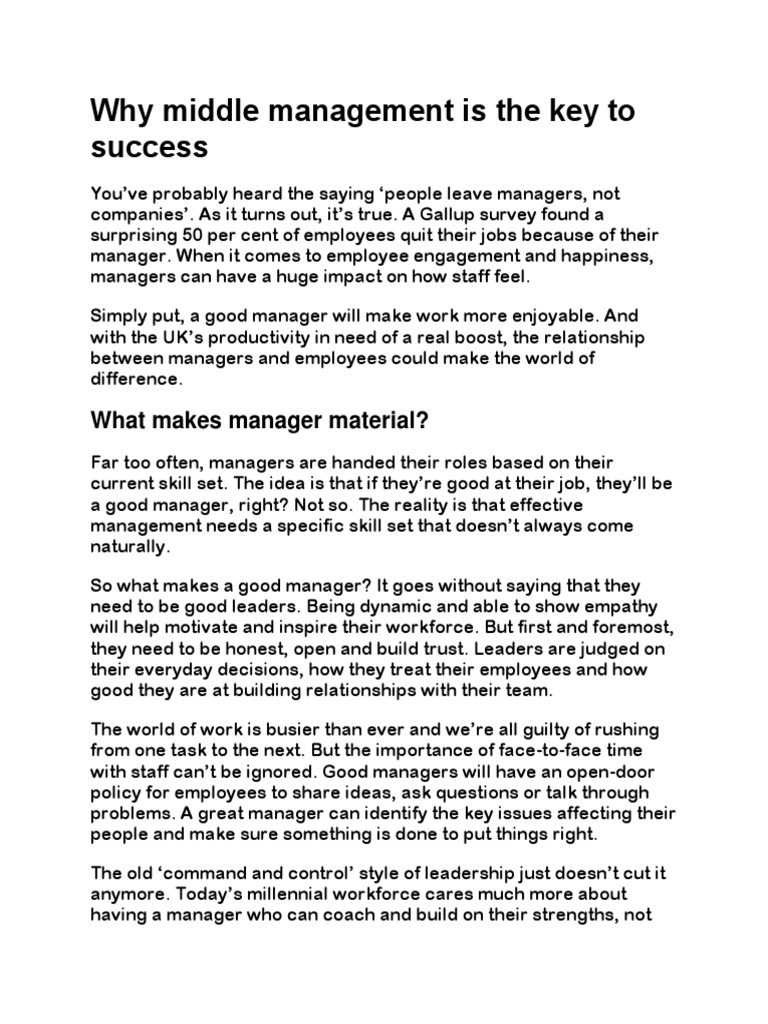Understanding The Value Of Middle Management In Today's Business Environment

Table of Contents
Bridging the Gap Between Leadership and Employees
Middle managers serve as a critical bridge, connecting upper management's strategic vision with the day-to-day operations and the frontline employees who execute them. This vital role ensures effective communication flows in both directions, fostering a collaborative and productive work environment.
Effective Communication and Information Flow
Middle managers act as a vital conduit, translating strategic objectives from upper management into actionable tasks for frontline employees and vice-versa. This two-way communication is paramount for successful execution and employee understanding.
- Clear communication of company goals: Middle managers ensure everyone understands the "big picture" and how their individual roles contribute to overall success.
- Feedback mechanisms: They establish systems for gathering feedback from employees, providing valuable insights to upper management and improving decision-making processes.
- Addressing employee concerns: Middle managers act as a buffer, addressing employee concerns and resolving conflicts before they escalate, preventing detrimental impacts on team morale and productivity.
- Conflict resolution: They mediate disputes and disagreements within their teams, promoting a harmonious and productive work environment.
- Fostering open dialogue: They create an environment where open communication is encouraged, promoting transparency and trust within the team.
Mentorship and Employee Development
Beyond communication, middle managers play a crucial role in mentoring and developing their teams, fostering a culture of growth and learning. This investment in human capital directly contributes to improved performance and retention.
- Performance reviews: They conduct regular performance reviews, providing constructive feedback and identifying areas for improvement.
- Talent identification: They identify high-potential employees and provide them with opportunities for advancement.
- Training and development opportunities: They facilitate access to training programs and development opportunities, ensuring their teams possess the necessary skills and knowledge.
- Career progression planning: They work with employees to create individual development plans, supporting their career aspirations within the organization.
- Fostering a positive work environment: They cultivate a supportive and inclusive work environment where employees feel valued and respected.
Driving Operational Efficiency and Productivity
Middle managers are directly responsible for the day-to-day operations within their departments. Their ability to streamline processes, allocate resources effectively, and implement strategic initiatives is essential for achieving operational excellence.
Streamlining Processes and Workflow
Middle managers are on the front lines of identifying inefficiencies and implementing improvements. Their expertise in process optimization is crucial for boosting productivity and reducing costs.
- Process improvement initiatives: They lead and participate in process improvement initiatives, identifying bottlenecks and streamlining workflows.
- Resource allocation: They effectively allocate resources (personnel, budget, equipment) to maximize productivity and efficiency.
- Workflow optimization: They analyze and optimize workflows to minimize delays and maximize output.
- Problem-solving: They identify and resolve operational problems quickly and effectively, minimizing disruptions.
- Performance monitoring and reporting: They monitor team performance, track key metrics, and report progress to upper management.
Implementation of Strategic Initiatives
Middle managers are not just executors; they are key players in translating overarching strategies into tangible results within their departments. Their execution capability is vital for organizational success.
- Project management: They manage projects, ensuring they are completed on time and within budget.
- Resource allocation: They allocate resources effectively to support the successful execution of strategic initiatives.
- Monitoring progress: They track progress towards strategic objectives, making adjustments as needed.
- Adapting to changing circumstances: They adapt strategies and tactics in response to changing business conditions.
- Ensuring alignment with company objectives: They ensure that all team activities are aligned with the overall strategic goals of the organization.
Fostering Employee Engagement and Motivation
Highly engaged employees are more productive, creative, and loyal. Middle managers are key to creating a positive work environment that fosters engagement and motivation, leading to improved retention rates and overall organizational success.
Building Strong Teams and a Positive Work Culture
Creating a positive work environment is paramount. Middle managers play a critical role in building strong, cohesive teams and nurturing a positive, collaborative culture.
- Team building activities: They organize team-building activities to foster camaraderie and collaboration.
- Fostering collaboration: They encourage collaboration and teamwork among team members.
- Recognizing and rewarding achievements: They recognize and reward employee achievements, boosting morale and motivation.
- Addressing employee morale issues: They promptly address employee morale issues, preventing them from escalating into larger problems.
- Promoting work-life balance: They support a healthy work-life balance for their team members, promoting well-being and reducing burnout.
Improving Employee Retention
Effective middle management significantly contributes to higher employee retention rates. By providing support, mentorship, and a positive work environment, they reduce employee turnover.
- Addressing employee concerns: They proactively address employee concerns and provide support when needed.
- Providing opportunities for growth: They provide opportunities for professional development and advancement.
- Creating a sense of belonging: They foster a sense of community and belonging within the team.
- Improving employee satisfaction: They actively work to improve employee satisfaction and morale.
Conclusion
This article has highlighted the crucial role of middle management in achieving organizational success. From bridging communication gaps and driving operational efficiency to fostering employee engagement and improving retention, middle managers are indispensable assets in today's business environment. Ignoring their value can lead to decreased productivity, low morale, and ultimately, hindered business growth. Invest in your middle management – providing them with the necessary training, support, and resources will significantly impact your organization's overall performance. Understanding and leveraging the value of middle management is key to building a thriving and successful business. Don't underestimate the power of strong middle management in achieving your strategic objectives. Invest in your middle management team today, and reap the rewards of increased productivity, higher employee retention, and a more successful organization.

Featured Posts
-
 F1 Controversiales Declaraciones De Un Piloto Argentino Sobre Argentina Y Uruguay
May 12, 2025
F1 Controversiales Declaraciones De Un Piloto Argentino Sobre Argentina Y Uruguay
May 12, 2025 -
 Economists Forecast Bank Of Canada Rate Cuts Due To Tariff Related Job Losses
May 12, 2025
Economists Forecast Bank Of Canada Rate Cuts Due To Tariff Related Job Losses
May 12, 2025 -
 Jessica Simpsons Ex Eric Johnson Supported Her New Music A Look Inside
May 12, 2025
Jessica Simpsons Ex Eric Johnson Supported Her New Music A Look Inside
May 12, 2025 -
 Nsfw Moment Selena Gomez And Benny Blanco Share Too Much Information
May 12, 2025
Nsfw Moment Selena Gomez And Benny Blanco Share Too Much Information
May 12, 2025 -
 Polemique Dals Ines Reg Eliminee Natasha St Pier Protegee Les Telespectateurs Reagissent
May 12, 2025
Polemique Dals Ines Reg Eliminee Natasha St Pier Protegee Les Telespectateurs Reagissent
May 12, 2025
